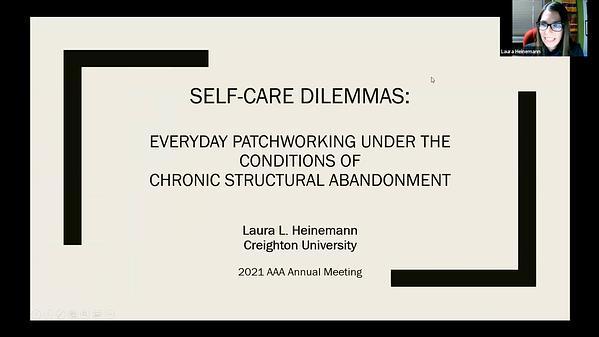Would you like to see your presentation here, made available to a global audience of researchers?
Add your own presentation or have us affordably record your next conference.
keywords:
global health
biomedicine
inequality
This panel explores the new forms of health inequality that come to emerge in social experiences of chronicity. In the fields of demography, medical geography, and global health, “the epidemiological transition theory” has structured a global imaginary of disease that is both chronological and geopolitical. According to this theory, the trajectory of economic development is marked by a shift from infectious diseases toward chronic diseases. Infectious diseases, then, ostensibly belong to the chronologically “behind” developing world, whereas chronic diseases are associated with modernity, prosperity, and the progressive improvement of the quality of life. The very notion of “chronic disease” under this framework prescribes a dichotomous biomedical paradigm•chronic versus acute•that has assigned specific “temporal assumptions in biomedical care” (Manderson and Smith-Morris 2010:14). Although it has been repeatedly debunked by empirical cases such as the current COVID-19 pandemic, the framework of epidemiological transition has prominently influenced the design and implementation of healthcare policy, biomedical research agenda, and global health intervention. Among anthropologists, however, the biomedical definition of chronicity has gained increasing scrutiny. For example, scholars have challenged it as being both individualistic and hegemonic (e.g., Solomon 2016; Yates-Doerr 2015). Further, ethnographic examples reveal how the science-centric framework of chronicity obscures the risks and vulnerabilities that are disproportionately distributed to socio-economically marginalized people (e.g., Hamdy 2012). Extending this line of study, this panel seeks to open up new political and ethical inquiries that the concept of chronicity entails. Addressing the AAA’s 2021 conference theme of “truth and responsibility,” this panel discusses how and by whom the notion of chronicity is defined, and how, accordingly, responsibilities of care temporally and spatially are assigned and to whom. We ask: How are the epidemiological, discursive, and institutional contours of chronic disease care configured in certain contexts? What kind of lifestyles and institutional support systems do chronic disease care paradigms presume? Moreover, probing the “social epidemiology” (Rapp 2000) of chronicity, how is chronicity conceived and contested by patients and their caregivers in everyday contexts? Furthermore, (assumedly) acute medical treatments often produce chronic effects, such as compromised economic potential, long-term medication, dependence on care, and stigma in social life. How, then, are these chronic effects experienced differently by people of different social positions? How does the narrow evaluation of chronicity inform clinical decision-making? To answer these questions, this panel includes papers that address a variety of topics including chronic diseases, care, and organ transplantation, seeking to explore the relationships between chronicity, responsibility, and health inequality in different socio-cultural and political contexts. References: Hamdy, Sherine. 2012. Our Bodies Belong to God: Organ Transplants, Islam, and the Struggle for Human Dignity in Egypt. Berkeley: University of California Press. Manderson, Lenore., and Carolyn Smith-Morris, eds. 2010. Chronic Conditions, Fluid States: Chronicity and the Anthropology of Illness. New Brunswick: Rutgers University Press. Solomon, Harris. 2016. Metabolic Living: Food, Fat, and the Absorption of Illness in India. Durham: Duke University Press. Yates-Doerr, Emily. 2015. The Weight of Obesity: Hunger and Global Health in Postwar Guatemala. Oakland, California: University of California Press.

